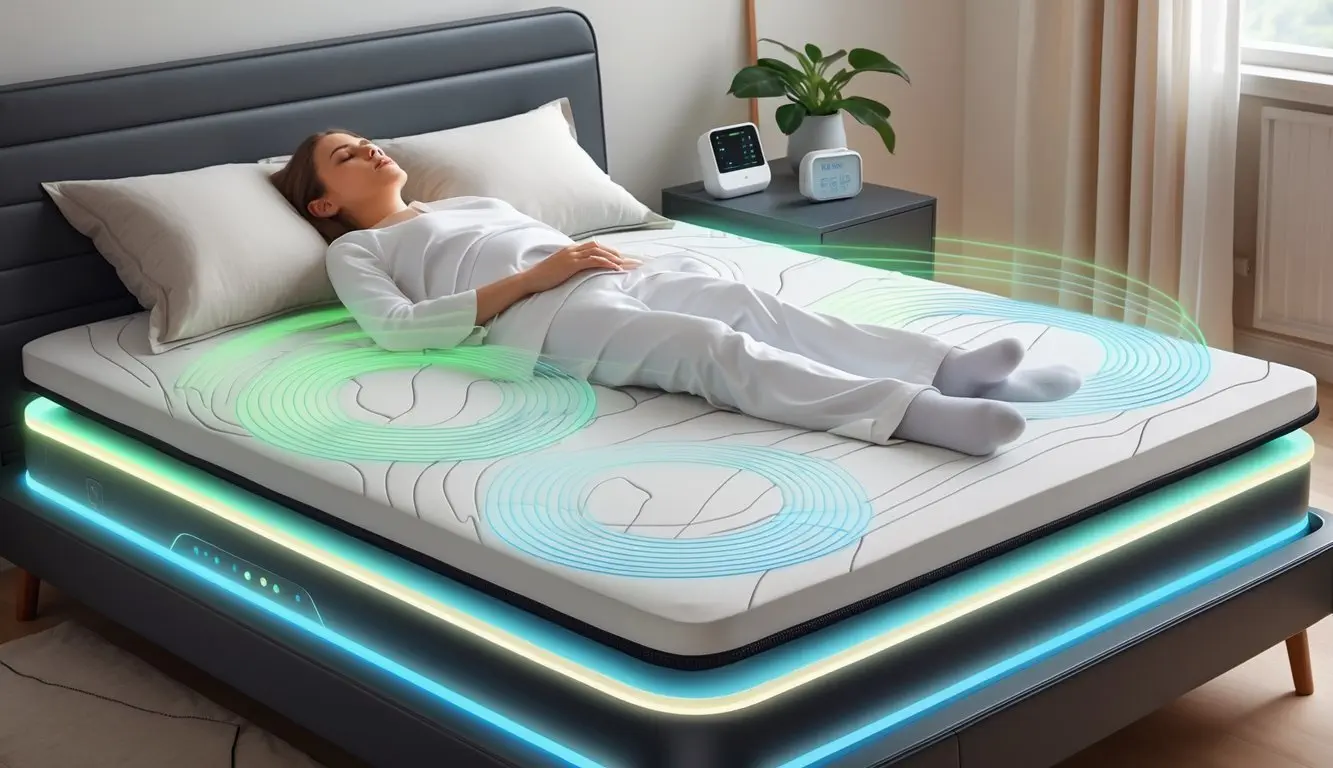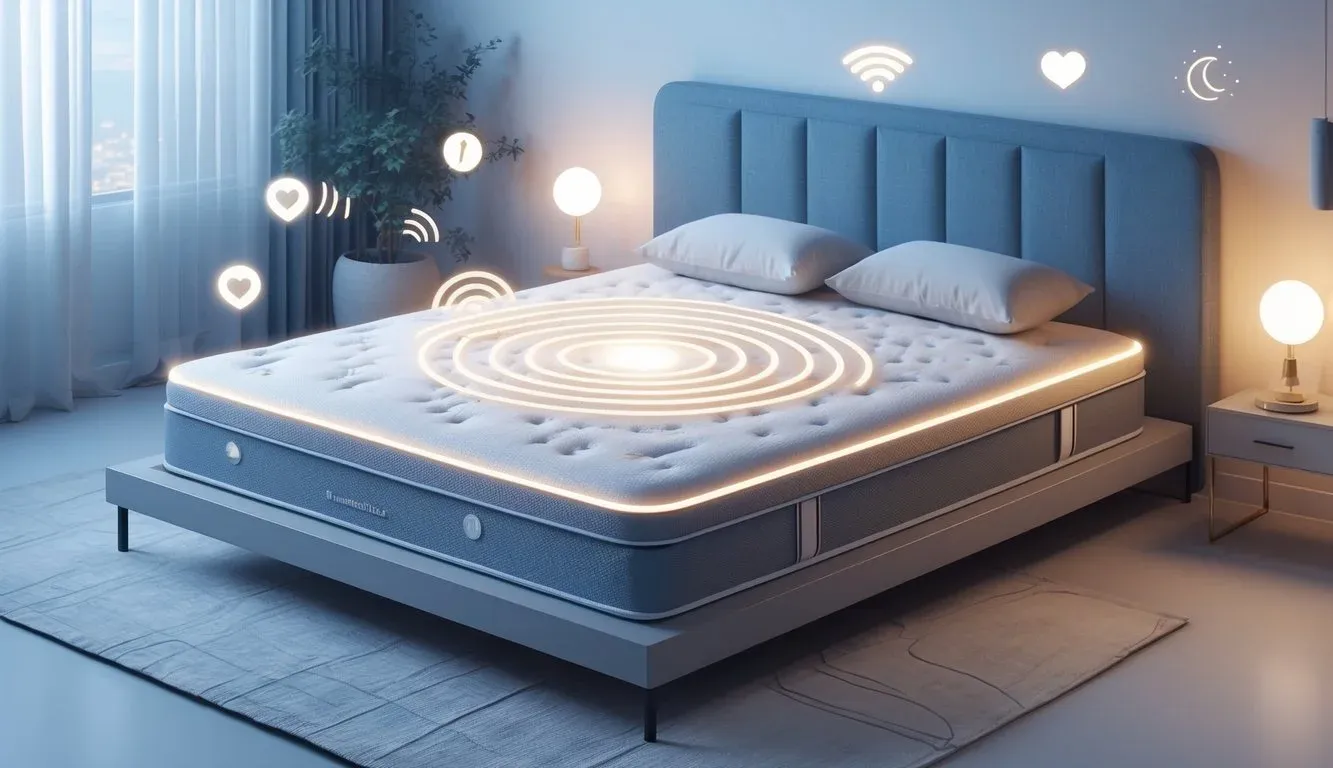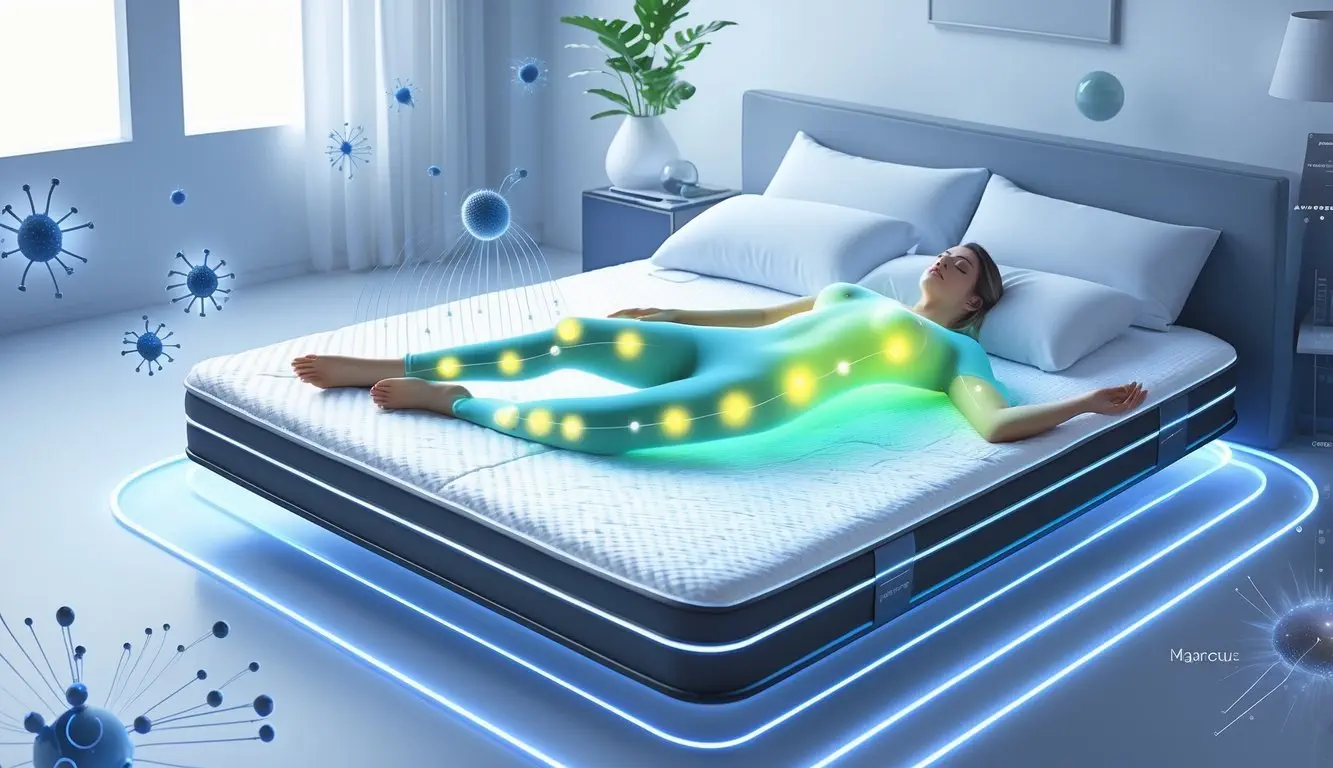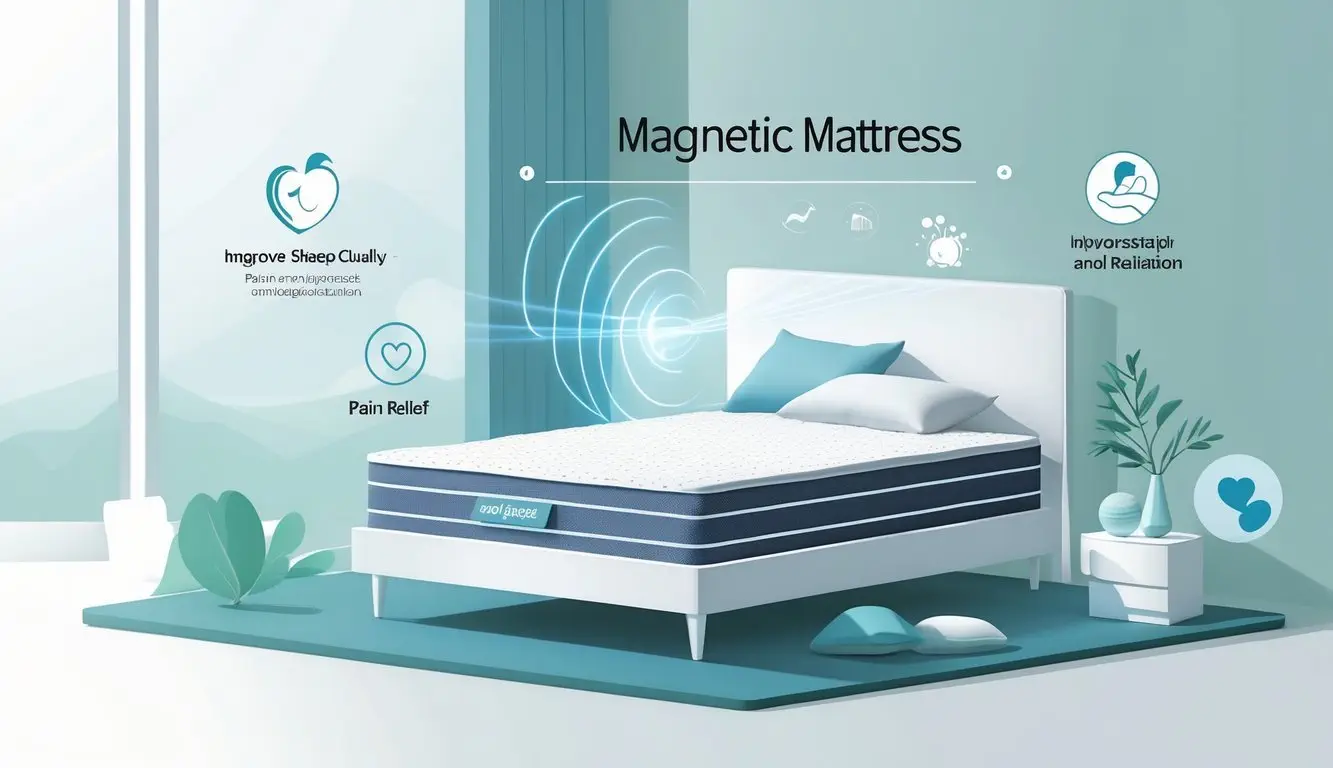Many people wonder if a magnetic mattress is worth the investment. These mattresses have magnets sewn inside and are often advertised as a way to help with sleep and pain. Some believe the magnets create benefits, while others are unsure if they actually make a difference.

Studies have not proven that magnetic mattresses work better than standard mattresses for sleep or pain relief. Most experts say there is little evidence to support the strong claims made by some brands.
People thinking about buying a magnetic mattress should know what the science says before spending extra money. This article covers the facts, possible risks, and real experiences so readers can decide if a magnetic mattress is right for them.
What Is a Magnetic Mattress?

A magnetic mattress is designed to include magnets or magnetic layers inside the padding or fabric. These beds are made to expose the body to magnetic fields during sleep and are often marketed for comfort or health benefits.
How Magnetic Mattresses Work
Manufacturers place magnets inside the mattress layers, usually between the cover and the foam or springs. The magnets are arranged in a pattern, sometimes covering the whole bed or just certain zones. The main idea is that while lying on the mattress, the user’s body is close to these fixed magnets for several hours.
Supporters of magnetic mattresses claim the magnets improve blood flow, help with pain, or promote better sleep. However, scientific research has not shown clear evidence for these benefits. Most magnetic mattresses work just like regular beds for comfort and support, with the only difference being the added magnets.
Some mattresses use removable magnetic pads instead of built-in magnets. These can be placed on top of a regular bed. The strength and layout of the magnets can vary from one brand to another.
Magnetic Fields in Mattresses
Magnetic mattresses use static magnets, not the strong magnets found in some medical equipment. The strength of these magnets is usually measured in gauss. Most mattress magnets range from 200 to 1,000 gauss, much lower than magnets used in MRI machines (which can be tens of thousands of gauss).
The magnetic field created by these bedding products doesn’t move or change. It is called a “static” or “permanent” magnetic field. The field is strongest near the magnet and decreases quickly the farther it gets from the surface.
Key features of magnetic fields in mattresses:
| Feature | Detail |
|---|---|
| Type of Magnet | Static (permanent) magnets |
| Field Strength | 200–1,000 gauss (usually) |
| Field Direction | Unchanging; spread out over mattress zones |
| Range | Strongest close to the magnet |
The use of magnetic fields in home mattresses is not the same as in medical use. There is no electric current or high-powered device. The magnets are usually small disks or strips sewn into the mattress layers.
The Science Behind Magnetic Therapy

Magnetic therapy is used in some mattresses to support health and comfort. Research looks into how magnets placed in bedding may affect the body and if the claims are supported by science.
Key Principles of Magnetic Therapy
Magnetic therapy uses static magnets that do not move. These magnets are built into products like mattress pads or toppers. People use these items hoping the magnets bring health benefits.
The main idea is that magnets may affect blood flow or nerves close to the skin. Supporters believe these changes might reduce pain or swelling. Most devices used in magnetic therapy, including magnetic therapy mattresses, use low-strength magnets.
Common product features include:
- Magnets sewn into the fabric.
- Flat or flexible designs to spread the field across the body.
- Claim of safe for home use.
Magnets in mattresses:
| Feature | Details |
|---|---|
| Type of Magnet | Static (unchanging) |
| Strength | Low, often under 1,000 gauss |
| Placement | Evenly spaced throughout the mattress |
Health Claims and Evidence
Companies selling magnetic therapy mattresses often suggest they can ease back pain, improve sleep, or help with arthritis. Some say these mattresses may help the body recover from injury faster.
Scientific studies on magnetic therapy show mixed results. According to many reviews, there is not strong proof that magnets relieve pain better than a placebo. Some people report feeling better, but these effects might be caused by comfort or belief, not by magnets.
The National Center for Complementary and Integrative Health (NCCIH) states that evidence does not clearly support magnetic therapy for most health claims. Most researchers agree that more studies are needed. Clinical guidelines do not recommend magnetic mattresses for serious health conditions.
Potential Benefits of Magnetic Mattresses

Magnetic mattresses are designed to improve comfort and may offer some health benefits. Claims usually focus on pain relief and improving blood flow during rest.
Pain Relief and Alleviating Discomfort
Many supporters of magnetic mattresses say they help relieve pain. The magnets in these mattresses are placed to target specific areas that often hurt, like the back or joints. Some users with chronic back pain or arthritis report feeling less sore after sleeping on one.
The idea is that magnetic fields might affect nerve signals linked to pain. Some small studies show that people feel less pain when using these mattresses, although results are mixed.
Common reasons people try magnetic mattresses for pain relief:
- Lower back pain
- Joint or muscle pain
- Stiffness in the morning
Doctors agree more research is needed. No major health group has said that magnetic mattresses definitely treat pain.
Enhanced Blood Flow
Another claim is that magnetic mattresses help increase blood flow. The theory is that magnetic fields can relax blood vessels, making it easier for blood to move through the body. Better blood flow may help muscles recover after daily activities or minor injuries.
A few studies with small sample sizes suggest minor changes in blood circulation while using magnetic fields. However, the evidence is not strong. Some people with circulation issues or cold feet say they notice a difference, but science has not confirmed these results widely.
Possible effects people look for:
- Reduced swelling
- Warmer hands and feet
- Faster recovery from aches
At this time, health professionals recommend using caution and not relying only on magnetic mattresses to fix blood flow problems.
Impact on Sleep Quality

Magnetic mattresses are designed to help people sleep better, but the real effects can depend on many factors. Current research and reviews from users share mixed and sometimes conflicting results.
Better Sleep and Restfulness
Many marketing claims say magnetic mattresses help people fall asleep faster and wake up feeling more refreshed. They are supposed to do this by using magnets to relax muscles and improve blood flow. Some users say they notice they wake less during the night and feel less achy in the morning.
However, studies have not proven strong links between magnets and better sleep. Some people sleep better simply because they expect to feel better, a result known as the placebo effect. Side-by-side comparisons with regular mattresses do not show large differences in sleep quality, restfulness, or time spent asleep. Most sources agree that comfort and support from the mattress itself play a bigger role in sleep quality than magnets alone.
Sleep Studies and User Experiences
Scientific sleep studies on magnetic mattresses are limited. A few small trials have looked at sleep patterns using special mattresses, but most results show little or no difference compared to regular beds. Larger studies with more people would be needed to prove real benefits.
User reviews are often mixed. About half say they felt some improvement in sleep or pain, while others notice no change at all. Some common feedback includes waking up less stiff, falling asleep faster, or feeling the same as with a normal mattress. Personal experience can vary because of differences in health, age, and sleep needs.
| User Feedback | % Reporting Change* |
|---|---|
| Slept better | ~50% |
| No difference | ~40% |
| Slept worse | ~10% |
*Estimates based on review summaries. Actual results may vary.
Considerations Before Buying a Magnetic Mattress

People buy magnetic mattresses for things like back pain, sleep problems, and improved comfort. There are important points to think about, like how well they work and any possible safety risks.
Effectiveness for Different Conditions
Scientific studies on magnetic mattresses have mixed results. Some users say they feel less pain or have better sleep, but there is not enough strong evidence to prove these mattresses always help. Most research shows only mild or short-term relief, not a cure for health problems.
The table below lists what magnetic mattresses are commonly used for and what the evidence says:
| Condition | Evidence Level | Notes |
|---|---|---|
| Back pain | Weak | Some report relief, but studies disagree |
| Arthritis | Inconclusive | Only minor benefits found |
| Insomnia | Not supported | No solid proof it helps sleep problems |
| General well-being | Anecdotal | Individual experiences can vary widely |
Many experts recommend testing other proven treatments first, as magnetic mattresses may not work the same way for everyone.
Possible Side Effects and Safety
Magnetic mattresses are usually safe for most adults, but not everyone should use them. People with pacemakers, implanted medical devices, or certain health conditions may be at risk because the magnets could interfere with their devices.
Some users have reported mild side effects like headaches, dizziness, or skin irritation. These side effects do not happen to everyone, but it is important to stop using the mattress if problems start.
Children, pregnant women, and people with metal implants are often advised to avoid using magnetic mattresses. Shoppers should always read warnings and consult a doctor before buying, especially if they have health concerns.
Comparing Magnetic Mattresses to Alternatives

Magnetic mattresses are marketed for better sleep and pain relief, but many people wonder how they measure up to regular mattresses and if the extra cost is justified. The important differences include claims of health benefits, upfront prices, and comfort levels.
Magnetic Therapy vs. Traditional Mattresses
Traditional mattresses use materials like springs, memory foam, or latex to support the body and reduce pressure points. They focus on comfort, durability, and proper spine alignment. Most buyers look for features like firmness, cooling, or motion isolation.
Magnetic mattresses include magnets sewn into the layers. Sellers claim these magnets improve blood flow and decrease pain. However, scientific research has not proven strong health benefits from the magnets themselves. Most doctors and sleep experts recommend focusing on a mattress’s support and comfort rather than on added magnets.
Table: Key Differences
| Feature | Magnetic Mattress | Traditional Mattress |
|---|---|---|
| Health Claims | Pain relief, better sleep | Proper support, comfort |
| Materials | Foam, coils + magnets | Foam, coils, latex |
| Proven Benefits | Inconclusive | Yes, for support/comfort |
Cost and Value Considerations
Magnetic mattresses often cost more than standard mattresses because of the extra magnets. Prices can range from a few hundred to thousands of dollars. Some brands promote long-term health savings, but there is not enough proof these mattresses perform better over time.
A good quality traditional mattress offers reliable comfort and can last 8–10 years. Warranties and trial periods can give buyers peace of mind. The best value for most people comes from picking a mattress that matches their body type, sleep style, and budget rather than from magnets or special features that lack strong evidence.
Long-Term Use and Maintenance

Magnetic mattresses have unique features that can affect how long they last and how owners should care for them. Both durability and routine maintenance can impact comfort, value, and satisfaction over time.
Durability of Magnetic Mattresses
Magnetic mattresses use magnets sewn into layers of foam or fabric. Most magnets are made from ferrite or neodymium, which resist rust and breakage. These magnets can last for many years without losing their properties.
The foam layers and outer fabric often wear out before the magnets do. Mattress lifespan depends on the quality of the foam, stitching, and cover. Typical lifespans range from 5 to 10 years, similar to regular mattresses. Heavy use, frequent moving, or a weak frame can shorten that time.
Check the manufacturer’s warranty for details about defects and expected lifespan. Some brands offer longer warranties on magnets than on the mattress itself.
Care Instructions
To keep a magnetic mattress in good shape, rotate it every 3 to 6 months. This helps prevent sagging and uneven wear. Avoid bending or folding the mattress, as this can damage both the foam and the magnets inside.
Use a mattress protector to keep spills, dust, and dirt away from the surface. Follow the care label for cleaning instructions—most covers can be spot cleaned with mild soap and water. Never use bleach or harsh chemicals.
Do not place electronic devices or metal objects close to the mattress for long periods. The magnets may affect some electronics or attract small metal pieces. Always check with the manufacturer for any warnings related to specific brands or models.
User Reviews and Expert Opinions

Many people look for guidance before buying a magnetic mattress. Consumers and experts offer different insights based on experience, study, and research findings.
Consumer Feedback
Most user reviews focus on comfort, pain relief, and sleep quality. Some individuals report feeling less back pain after sleeping on a magnetic mattress for a few weeks. Others mention better sleep or fewer nighttime awakenings.
However, not all consumers are satisfied. A significant group finds no noticeable difference in pain or sleep. Common complaints include the mattress feeling too firm or too soft, or not living up to marketing promises.
Key pros mentioned by users:
- Easier mornings
- Slight pain relief
- Comfort from mattress material
Common cons:
- No change in pain or sleep
- High price
- Uncomfortable firmness
Customer ratings usually fall between 2 to 4 stars out of 5. Most reviews suggest the experience is mixed, with some positive and some negative effects.
Expert Analysis
Medical experts and researchers have studied magnetic mattresses for several years. According to published clinical trials, there is little strong evidence that magnetic fields in mattresses provide significant pain relief or improve sleep for most people.
Major health organizations, such as the National Institutes of Health, state that scientific proof of benefits is lacking. Most experts agree that comfort and sleep improvements are likely due to mattress design and quality, not magnets.
Some doctors warn that people with pacemakers or other medical implants should avoid magnetic products. Experts also note that high prices are not always linked to better results.
What experts look for:
- Clinical study results
- Safety for people with health conditions
- Honest product claims
Most advice from professionals is to consider proven sleep solutions before choosing a magnetic mattress.
Conclusion

A magnetic mattress may offer comfort and relaxation to some users. It can be an option for people who are interested in trying non-traditional sleep products.
Pros of a magnetic mattress:
- Easy to use
- No electricity needed
- May help some users feel relaxed
Cons of a magnetic mattress:
- Limited scientific proof
- Can be expensive
- Not everyone notices benefits
Some people say they sleep better on a magnetic mattress. Others do not notice any change. The effects depend on individual needs and preferences.
Those with medical devices such as pacemakers should ask a doctor before use. Pregnant women or people with certain health conditions also need to consult a healthcare provider.
It’s important to compare options before making a decision. Reading user reviews and talking to a doctor can help someone decide if a magnetic mattress is right for them.
A simple chart to help compare features:
| Feature | Regular Mattress | Magnetic Mattress |
|---|---|---|
| Price | Varies | Usually higher |
| Scientific Support | Strong | Limited |
| Health Risks | Few | Possible for some |
| User Experience | Widely positive | Mixed |
People should consider their budget, health, and comfort when making a choice.
Frequently Asked Questions
Magnetic mattresses are marketed for pain relief, sleep improvement, and possible health benefits. Questions remain about scientific proof, safety, cost, and how they compare to regular mattresses.
What are the potential benefits of using a magnetic mattress for pain relief?
Some people use magnetic mattresses to try and reduce back pain or joint discomfort. Manufacturers claim that magnetic fields can improve blood flow or ease soreness. There is not much strong scientific evidence to confirm these results.
Are there any scientifically proven effects of magnetic therapy in bedding?
Studies on magnetic bedding are limited and results are mixed. Most large medical organizations do not officially support the health claims made by magnetic mattress makers. Some small studies report minor improvements in pain, but more research is needed.
What should be considered when looking at the cost versus benefits of magnetic mattresses?
Magnetic mattresses and toppers often cost more than regular bedding. Buyers should weigh the extra price against the possibility of limited or unproven benefits. Many people may not see noticeable changes and could consider less expensive options for sleep or pain issues.
Can sleeping on a magnetic mattress topper improve overall health?
There is no clear evidence that magnetic mattress toppers improve overall health. Some users report better sleep or less pain, but these effects might also come from the mattress’s comfort, not the magnets themselves. Most health experts say results can vary from person to person.
Are there any side effects or risks associated with using a magnetic mattress?
Most people do not report side effects from using a magnetic mattress. However, people with pacemakers or certain medical implants should check with a doctor before using one. The magnetic fields in these products are usually weak, but safety should always come first.
How does a magnetic mattress compare to traditional mattresses in terms of effectiveness?
Traditional mattresses use materials like memory foam or springs for comfort and support. Magnetic mattresses add magnets but may not be more effective for sleep or pain relief. Research does not show strong or consistent differences between these types in terms of health benefits.